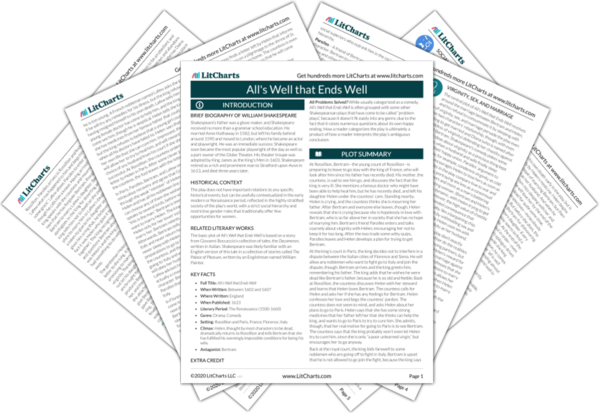Brief Biography of William Shakespeare
Shakespeare's father was a glove-maker, and Shakespeare received no more than a grammar school education. He married Anne Hathaway in 1582, but left his family behind around 1590 and moved to London, where he became an actor and playwright. He was an immediate success: Shakespeare soon became the most popular playwright of the day as well as a part-owner of the Globe Theater. His theater troupe was adopted by King James as the King's Men in 1603. Shakespeare retired as a rich and prominent man to Stratford-upon-Avon in 1613, and died three years later.
Historical Context of All's Well that Ends Well
The play does not have important relations to any specific historical events, but can be usefully contextualized in the early modern or Renaissance period, reflected in the highly stratified society of the play’s world, with a strict social hierarchy and restrictive gender roles that traditionally offer few opportunities for women.
Other Books Related to All's Well that Ends Well
The basic plot of All’s Well that Ends Well is based on a story from Giovanni Boccaccio’s collection of tales, the Decameron, written in Italian. Shakespeare was likely familiar with an English version of this tale in a collection of stories called The Palace of Pleasure, written by an Englishman named William Painter.
Key Facts about All's Well that Ends Well
-
Full Title: All’s Well that Ends Well
-
When Written: Between 1602 and 1607
-
Where Written: England
-
When Published: 1623
-
Literary Period: The Renaissance (1500-1660)
-
Genre: Drama, Comedy
-
Setting: Rossillion and Paris, France; Florence, Italy
-
Climax: Helen, thought by most characters to be dead, dramatically returns to Rossillion and tells Bertram that she has fulfilled his seemingly impossible conditions for being his wife.
-
Antagonist: Bertram
Extra Credit for All's Well that Ends Well
